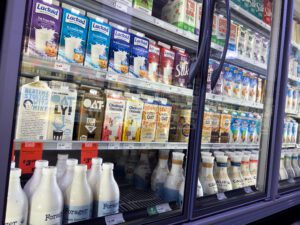Human Barbie Mom Grooms Daughter to Be a Barbie-Wannabe Just Like Herself
May 21, 2016
 347
347 
It starts off sounding like a joke: “Did you ever hear the one about the lady that wanted to look like Barbie so much that she . . . (insert punch line here).” Except it’s not a joke. A 51 year old England resident, Sarah Burge calls herself a “Human Barbie” and has spent nearly a million dollars for reconstructive surgery in an effort to be a splitting image of Mattel’s infamous doll.
Sounds like an attempt to get in the Guinness Book of World Records for “most elective surgeries” if you ask me! But I digress . . .
After last year’s headline-grabber of Sarah teaching her seven year old daughter, Poppy, how to pole dance; her plastic surgery addiction has put her in the spotlight again. And this time it puts Poppy on center stage. Most little girls enjoy getting gifts like stuffed animals, dolls, and maybe a bike; but gift-giving at the Burge household is a little less typical. For her birthday, Poppy received a gift certificate, and it wasn’t for a trip to Build-A-Bear. The little girl (remember, age seven) received a coupon for breast enlargement surgery on her 16th birthday. Christmas was no different! For that festive holiday, Poppy received yet another gift certificate, this one for liposuction, to redeem on her 16th birthday as well. For the record, elective surgeries are legal once you are 16 years of age in the U.K.
How do you think Poppy felt about this? Well, she has been quoted by a London newspaper saying, “I can’t wait to be like mummy with big boobs. They’re pretty.” Poppy has said that she is pleased about the gift certificates given to her because they may be useful if she “looks weird or something.”
This isn’t about getting in shape or getting a new haircut, which can often make a person feel more confident or happy with herself. It appears that this is about a young girl who is being groomed for a life full of plastic surgery to fix anything that is less than “perfect.”
So, the question arises: Is Sarah inadvertently teaching Poppy that she is not good enough or that she will never be (or should never be) happy with herself?
One can’t help but wonder what kind of positive physical and emotional support Sarah currently gives to Poppy when Poppy is being encouraged to use cosmetic surgery at such a young age. Is this a form of child abuse? Many parents are left outraged, feeling that little girls should be able to enjoy their youth and not be pushed into growing up sooner than necessary. These types of parents definitely don’t agree with Sarah’s choices.
The Apple Doesn’t Fall Far
Sarah herself was seven years old herself the first time she had plastic surgery, having her ears pinned back because they “stuck out too much.” Sarah’s mother gave her a “gift” of cosmetic surgery when she was young, and it’s possible Sarah feels that since it was bestowed upon her, then it’s good enough for her daughter too. Maybe she wishes for her daughter to be just like her as well.
Sarah’s been quoted as saying, “I’m just supporting her to make her dreams come true. There shouldn’t be a stigma around wanting to look good.” But is she sending her daughter down an impossible road in search of superficial and impossible perfection? With all of this attention based on achieving physical excellence, has anyone given any thought to the risk of botched surgeries? Whatever happened to being a natural beauty and being taught to love yourself as you are?


In recent years, seed milks have gained popularity as a nutritious and eco-friendly alternative to dairy and other plant-based milks. Marketed as a healthy option, these beverages are often touted for their rich nutrient profiles and sustainability. However, a closer look reveals that not all seed milks are created equal. Many contain hidden ingredients and […]


NOTICE TO THE PUBLIC! A vast array of products seen in American grocery stores are notably absent on European shelves. This is not due to a lack of international trade but rather stringent food safety regulations in the European Union. Many popular American foods are banned in Europe due to concerns about health risks and […]


Did you know that there lurks an invisible ingredient in meat that has been raising health concerns —It is called meat glue- scientifically known as transglutaminase? Transglutaminase is an enzyme used to bind pieces of meat together to create larger, more uniform cuts that creates a seamless appearance. According to the American Meat Institute, it […]